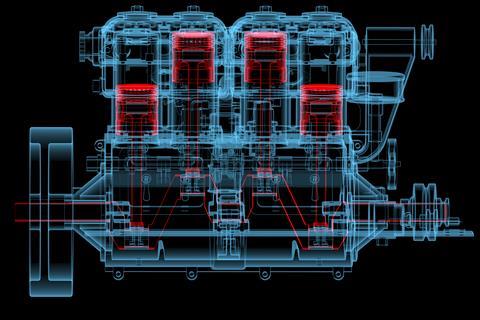The Effect of Ingenious Engine Technologies on Power Performance and Environmental Sustainability
In the realm of transport and commercial equipment, the continual pursuit for improved power performance and lowered environmental influence has led to substantial developments in engine technologies. From the gradual shift towards electric and hybrid systems to the combination of turbocharging for boosted performance, the landscape of engines is progressing quickly.
Development of Engine Technologies
The progression of engine technologies over the years has been marked by continuous innovation and improvement in pursuit of boosted performance and efficiency. From the very early days of interior burning engines to the advanced hybrid and electric powertrains of today, the development of engine innovations has actually been driven by an unrelenting quest for enhanced fuel efficiency and lowered discharges.
One significant turning point in this development was the development of turbocharging and straight injection systems, which substantially enhanced engine power outcome while enhancing gas efficiency. These innovations permitted smaller sized, a lot more lightweight engines that could provide the performance of bigger ones without endangering on effectiveness.
Additionally, advancements in products science have resulted in the extensive adoption of light-weight materials such as light weight aluminum and carbon fiber in engine construction. This has not only decreased general car weight but has actually likewise enhanced engine efficiency by lessening energy losses connected with inertia and rubbing.
Advantages of Electric and Hybrid Equipments
With the growing emphasis on sustainability and power performance, what benefits do hybrid and electric systems supply in the world of engine modern technologies? Furthermore, electric and hybrid systems are much more energy-efficient, converting a higher percentage of saved power into propulsion contrasted to traditional engines. Crossbreed systems combine the advantages of electric propulsion with the adaptability of a burning engine, providing extended driving varieties and minimizing range anxiety for customers transitioning to electric vehicles.
Turbocharging for Improved Effectiveness
Turbocharging works by utilizing a wind turbine to compel more air into the combustion chamber, allowing for far better fuel combustion and enhanced power output without a significant rise in engine dimension. By taking full advantage of the efficiency of the combustion process, turbocharged engines can achieve improved gas economy and lowered exhausts, adding to environmental sustainability. The prevalent adoption of turbocharged engines in both fuel and diesel vehicles shows their performance in balancing efficiency, effectiveness, and ecological impact.
Using Alternate Fuels
Taking advantage of alternative gas offers an encouraging avenue for minimizing carbon emissions and expanding the power sources utilized in transportation. As why not look here the world makes every effort to battle environment modification and reduce reliance on nonrenewable fuel sources, different gas have gained significant focus for their prospective ecological and financial advantages.
Biofuels, such as ethanol and biodiesel, are acquired from eco-friendly resources like sugarcane, corn, and algae, providing a cleaner burning option to conventional gasoline and diesel. These gas can be blended with existing petroleum gas or utilized in specialized engines, supplying a path to reduced greenhouse gas emissions and enhance air top quality.
In addition, hydrogen fuel cells have actually become an appealing technology for zero-emission transportation. engines for africa. By transforming hydrogen gas into electrical power to power electric motors, gas cell cars create just water vapor as a byproduct, getting rid of harmful tailpipe emissions totally
Along with reducing carbon emissions, alternative fuels can also improve energy protection by expanding the fuel mix and reducing dependence on imported oil. Welcoming alternate fuels in transport is a vital step in the direction of accomplishing a more ecologically friendly and sustainable future.

Future potential customers and environmental advantages
The environmental benefits of alternate fuels and their potential for lasting sustainability are key factors to consider in the transition towards cleaner energy resources. Alternate fuels, such as biofuels, hydrogen, and electricity, deal substantial ecological advantages compared to conventional nonrenewable fuel sources. These gas produce lower degrees of greenhouse gas discharges, reducing air pollution and mitigating climate adjustment influences. Additionally, different fuels can help branch out power resources, enhancing energy safety and security and reducing reliance on limited sources.
The future leads for different gas in the transportation industry are promising. Advancements in technology remain to enhance the efficiency and cost of different gas vehicles, making them extra obtainable to consumers. Federal governments around the globe are likewise implementing policies to incentivize the basics fostering of different fuels, even more driving their growth. As r & d efforts expand, the potential for even greener and more sustainable fuel options enhances, paving the way for a cleaner and a lot more eco-friendly transportation industry. By welcoming different gas and innovative innovations, the course towards an extra lasting future comes to be increasingly attainable.

Conclusion
In conclusion, cutting-edge engine modern technologies Homepage have actually played a vital function in improving energy efficiency and promoting ecological sustainability. The evolution of engine modern technologies, adoption of hybrid and electrical systems, usage of turbocharging, and exploration of alternative fuels have all added to decreasing exhausts and increasing efficiency.
In the world of transport and commercial equipment, the continuous pursuit for improved power effectiveness and decreased ecological influence has actually led to substantial improvements in engine innovations. Turbocharging jobs by making use of a turbine to compel even more air into the combustion chamber, enabling for better gas combustion and raised power outcome without a considerable boost in engine size. By optimizing the efficiency of the combustion process, turbocharged engines can achieve better gas economic situation and reduced discharges, contributing to environmental sustainability. Different gas, such as biofuels, hydrogen, and electrical energy, deal substantial environmental benefits contrasted to conventional fossil fuels. The development of engine modern technologies, fostering of hybrid and electrical systems, application of turbocharging, and expedition of alternate gas have all contributed to raising and decreasing exhausts performance.